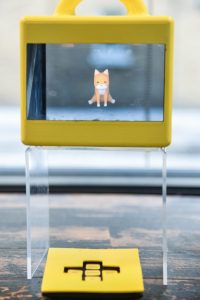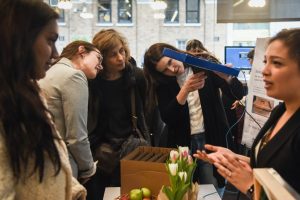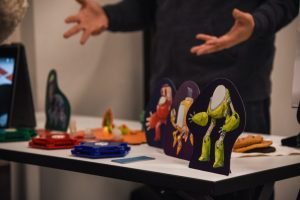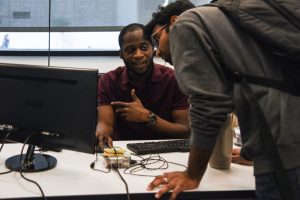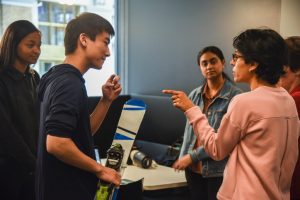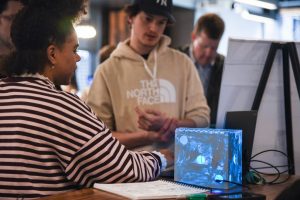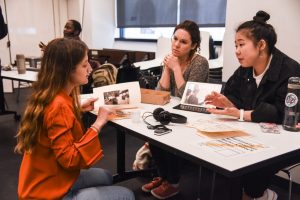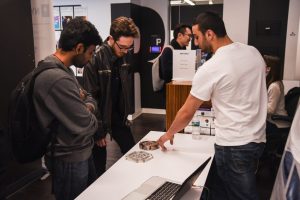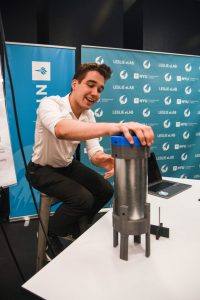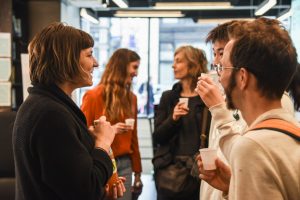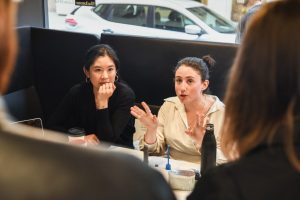This post was originally published on the MakerSpace blog.
Being open to surprises, Testing with users and iterating again and again.
On May 1st 2019, we had our Spring Prototyping Fund Showcase, which as previous years reflected the strong interest of NYU students for social issues and sustainability: from reusable tampon applicators that limit waste to a sensor-enabled beehive lid to protect bee colony loss, a mobile pop-up exhibit to change perception about homelessness and a battery system using reusable batteries to provide power during blackouts or grid failures in African countries. Education was definitely a focus of interest for several teams whether through strategy games, a holographic pet or light-sensor cube. To get more info on graphics, people can check here!
The prototypes presented reflected the gamut of prototyping: from work-like prototypes (e.g. an efficient, powerful and lightweight motor, a foldable-ski) to look-like and experience prototypes. In all cases, teams have gone from several iterations and many have been able to do user testing and others were planning to do this during the coming months. Some of the key learnings from the team were:
- You need to be open to surprise – whether good or less good (it does not work but why).
- You learn so much when you test with users even though it can be scary at first.
- It’s a long process and while it can be frustrating at time, there is much to learn out of it.
Since 2013, the NYU Prototyping Fund (a collaborative program offered by the Design Lab @ NYU Tandon MakerSpace and the NYU Entrepreneurial Institute) has awarded teams of students up to $500 for phase 1 and up to $2000 for phase 2 to build hardware or software prototypes, and connects them with the resources, tools, and mentors they need to bring their ideas to life.
Past awardees have gone on to win the $300k Entrepreneurs Challenge and Innovention Competitions, receive grants from NYU Green Grant, VentureWell and the NSF, raise angel/venture capital funding and many remain in business shipping products and generating revenue!
This spring we selected 11 teams for phase 1 and 2 teams for phase 2. Teams included students from multiple programs, majors and schools (Gallatin, Steinhardt, Stern, Tandon, Tisch) reflecting the value of interdisciplinarity and collaboration to generate novel ideas.
To learn more about all projects, see below.
Phase 1
Comma: is a reusable tampon applicator that limits waste associated with people's menstrual cycles. Emily Gordin, Gallatin BA ‘19; Nicole Acero, CAS BS ‘19; Audrey Burt, Gallatin, BA ‘19; Emma Williams, Gallatin BA ‘19; Stephanie Frieman, Steinhardt, BA ‘19
Deluge: The first massively-multiplayer board game in which players explore and discover a world of extreme climates through co-operation and tactical strategy. Jeff Petriello, Tisch MFA ‘19; Oliver Hong, Tisch MFA ‘19; Edanur Kuntman, Tisch MFA ‘19
Elixir: an 8% alcoholic kombucha that is low in sugar and calories, high in flavor and fits your lifestyle so you can indulge, feel good, and not skip a beat. Jessica Willis, Steinhardt MA ‘19 and Armaan Ahmed, Gallatin BA ‘22
Foldable Alpine Skis: design and build a pair of safe, cost-effective, and functional foldable Alpine skis. Xinyang Liu, Tandon BS ‘22; Monserrate Valdez, Tandon BS ‘22; Begum Ferdous, Tandon BS ‘22
I C: A wearable technology that integrates state-of-the-art computer vision methods and microcomputers to aid the visually impaired in navigating their surroundings. Samuel Boahen, Tandon BS ‘21 and Alula Haile, Tandon BS ‘21
PepperPet: An interactive, holographic digital pet projected in a portable box made to instill responsibility in children, and for families who are unable to adopt pets due to health or financial reasons. Tengku Hana Shafikah, Tandon BS ‘22; Belinda Che, Tandon BS ‘22; Lambert Wu, Tandon BS ‘22; Neha Vasudevan, Tandon BS ‘22
The PitchCube is designed to help kids with disabilities learn music through color, or even just a way to add color ambience to any event. Katherine McFarlane, Steinhardt BA ‘21
Placemaking Reimagined is a project that aims on changing the public perception about homelessness in New York City through a series of pop-up exhibitions. Ashley Tang, Steinhardt BS ‘19; Katya Rozanova, Gallatin MA ‘19; Kelsey Murphy, Gallatin MA ‘19; Suqi Wu, Tandon BS ‘21
Reliable Power is an uninterruptible power supply, assembled from recycled lithium polymer ion batteries, that will charge while electricity is available and provide power during blackouts or grid failures. The battery system will replace the generators already in place, reducing fossil fuel consumption and noise/environmental pollution. Somto Ejinkonye, Tandon BS ‘21
SynSpectra Bioreactor: A bioreactor that controls the production of pharmaceutical drugs in genetically engineered bacteria through the transmission of light signals. Dong Hyun Sung, Tandon BS ‘21; Ali Hasan, Tandon BS ‘20; Steven Ionov, Tandon BS ‘19
WebSight:is a company that seeks to empower the next generation of blind students by making education in coding more accessible. Alexander Rein, Stern BS '20 and Ethan Reznikoff, Gallatin BA '19
Phase 2
Beespect: Sensor-enabled beehive lid for commercial beekeepers that aims to reduce colony losses over the winter season by reporting hive microenvironment data. Octavia Larentis, Tandon MS ‘19 and Monica Mendoza, Tandon MS ‘19
Merciless Motors: Efficient, powerful and lightweight motor. Anna Kotyza, Gallatin BA ‘19 and Nader Ahmed, Tandon BS ‘19




